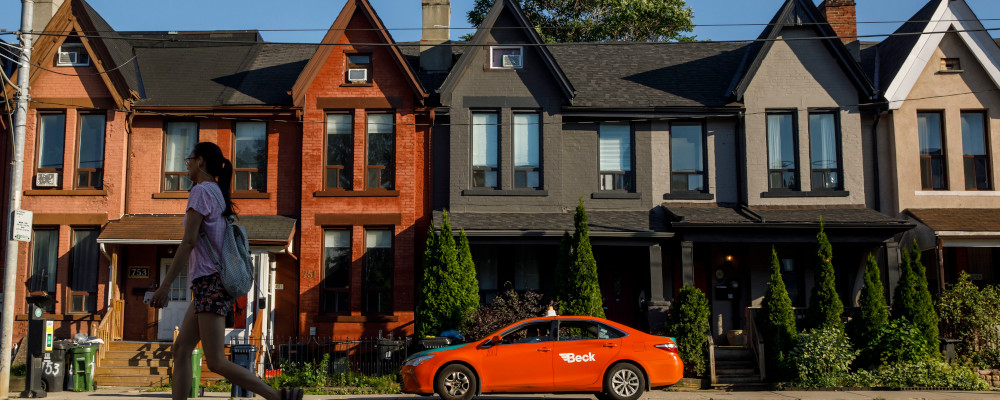The headline was bold. “Torontonians making median income need to save for about 25 years to buy a house in the city.” That was the takeaway from a National Bank of Canada housing affordability study this summer. Bold as it was, I’m not sure it quite captured the depths of the problem. This isn’t just a middle-class problem. Even the mayor’s salary isn’t enough to qualify for a mortgage on the typical GTA home!
Typical households without inherited wealth have virtually no chance of getting into the city’s housing market if they haven’t already. But it’s not just middle-class income earners that are locked out right now. If your household income isn’t in the top ten percent, and you don’t have home equity, substantial savings, or family wealth, you’re probably not getting into the Toronto housing market.
Yes, you read that right. The top ten percentile. National Bank’s study estimates that the qualifying income required to buy a typical GTA home is $225,042. In other words, a family needs to be within the top ten percent of income earners in order to qualify for the typical GTA mortgage. They also require a downpayment of $222,236. This excludes the vast majority of people who don’t already have significant home equity or family money. To put that in context, the mayor earns $216,160.13. Good thing she already owns a home!
The numbers are less daunting if we’re looking at condos, but the math there still isn’t great. National Bank lists the qualifying income for a typical GTA condo at $160,820. According to Statistics Canada, the families in the 90th percentile for household income earn around $162,000 (with a downpayment of just over $40,000). Toronto city councilors earn $128,346.89. With a second income, new city councilors might well have a hope of getting on the property ladder.
Of course, these are averages. Surely a bootstrapping couple could sniff out a bargain if they’re willing to commute a bit further, and maybe give up on that second bedroom. Indeed, even in the Old City of Toronto there are condos available for under $600,000. So theoretically, there is some hope for people without family cash outside of the top ten percentile to get onto the property ladder if they’ve got the downpayment. Anecdotally, take one condo listing in a trendy east end neighbourhood for $599,000. Some quick and dirty math using a bank mortgage calculator suggests a required income of about $150k and a downpayment of around $37k. That still means being in the eighth decile of income earners—and about $66k above the median household income in Toronto.
Of course, there are many assumptions that go into these calculations. For instance, if you’re already on the housing ladder and have some equity built up, trading up may be easier. Or you might have substantial savings and investments or (more likely), parents willing to give you an advance on your inheritance. So, in reality, there are a lot of people out there who don’t have especially high incomes but have the ability to buy homes. My point here is that income isn’t really enough, unless you’re near the top.
Now, I know it’s not news that Toronto housing is expensive. But I don’t think most people realize just how bad it’s gotten recently. After all, around two-thirds of families own their homes. Most didn’t buy them yesterday. And a lot has changed over the past few years.The average Toronto home price was under $500,000 until 2013. It climbed to over $600,000 in 2015; over $700,000 in 2016; over $800,000 in 2017; over $900,000 in 2019; and over a million in 2021. Those headlines hit really differently if you already own a home than if you’re saving, in vain, for a downpayment.
The worst part of this is that it’s hard to envision a scenario where prices are lower by the end of the decade than they are now, absent an economic catastrophe. The reason is simple: there’s a large gap between population growth and housing completions—not just in Toronto, but Canada-wide. While there’s been outmigration from Toronto to the rest of the GTA and out of the province, the markets people are moving to are getting bid up because they’re not able to build fast enough to accommodate Toronto expats. While there was a bit of slack in housing markets outside of Toronto, that’s largely gone now. So there isn’t really a pressure release valve for Toronto’s housing market.
Lest I seem nihilistic, there are things we can do to get more housing built. Indeed, local and provincial governments in Toronto and beyond have made some progress—particularly in legalizing “missing-middle” housing (e.g. housing types that range from duplexes to small apartments). However, there’s much more to be done.
There’s a pretty broad consensus that we need to double housing starts to make up for a deficit of somewhere between 1.5 and 2 million houses and to accommodate growth. However, even though we’ve pulled some notable policy levers, housing permits are on the decline as high interest rates and a tight labour market pressure the home-building sector. So we’re not just failing to meet the required pace of increase. We’re falling further behind.
Reversing this decline is going to take a wartime effort, as many others have written. We’re going to need the provincial government to finally implement all of the 55 recommendations of its Housing Affordability Task Force (thus far it’s stuck at eight). But we need the federal government to get involved as well.
There are plenty of levers the federal government can pull, ranging from tax policy to building social housing—though, as I’ve written elsewhere, we should temper our expectations for how much we can achieve through social housing. I want to focus on one idea in particular that I think is both well overdue, and that needs to be bolder.
I’m talking about tying infrastructure funding to local home building. The idea is controversial—or was, until recently. After all, a lot of people are rightly squeamish about the federal government attaching strings to funding for subnational governments. Moreover, it was pretty consensus until recently that the federal government didn’t have much of a role in housing policy. But local governments face terrible incentives when it comes to housing. They answer to existing homeowners, not prospective home buyers. If the goal is to get more homes built, the provincial government is better positioned to oversee land use. But federal policy influences home prices in a number of ways. In a housing emergency, we should expect them to react.

Besides, tying infrastructure funding to homebuilding makes sense even outside of a housing crisis. After all, large public transit projects are justified in part by the idea that more transit service will lead to more nearby housing. There’s even an industry term for it: “transit-oriented development.” If you’re building a train station and not permitting nearby housing, you’re not going to get the originally projected ridership numbers. If the federal government is going to spend money on local public transportation, they should demand results.
Of course, the details will matter. This is what keeps me up at night. The Conservative Party has committed to this approach. That is commendable. But their targets aren’t ambitious enough. According to their website, a CPC government would:
Require unaffordable big cities like Vancouver to increase homebuilding by 15 percent annually or face big financial penalties and have portions of their federal funding withheld.
Fifteen percent isn’t nothing. That would be progress. But, recall, we need to double housing starts. We don’t just need a few extra apartments by transit stops. We need a homebuilding boom like nothing we’ve seen in decades. That will ruffle a lot of feathers. Longstanding homeowners in Old Toronto and Vancouver won’t like it at all.
Having a concrete plan to meet Canada’s housing needs would draw some fire. The pearl-clutching would be relentless. We’ll hear all kinds of sob stories about people worrying that an apartment on their block might lead to more traffic (or cast shade on their gardens!). But if we want to avoid pricing an entire generation out of the housing market, we’re going to need more than just rhetoric. We need bold action.
In the meantime, we can hope that governments of all stripes find religion on housing. Anyone seeking to replace those governments needs to come up with a credible plan if they want to move the needle on housing affordability.
Recommended for You

Supply management will be sacrificed to appease Trump, and the Netflix takeover is bad for Hollywood: The Hub predicts 2026

Canada will attempt to join the EU and Justin Trudeau becomes a Katy Perry lyric: The Hub predicts 2026

Why Danielle Smith is the newsmaker of the year

I was an early supporter of B.C.’s Indigenous rights laws. Here’s why I’ve changed my mind



